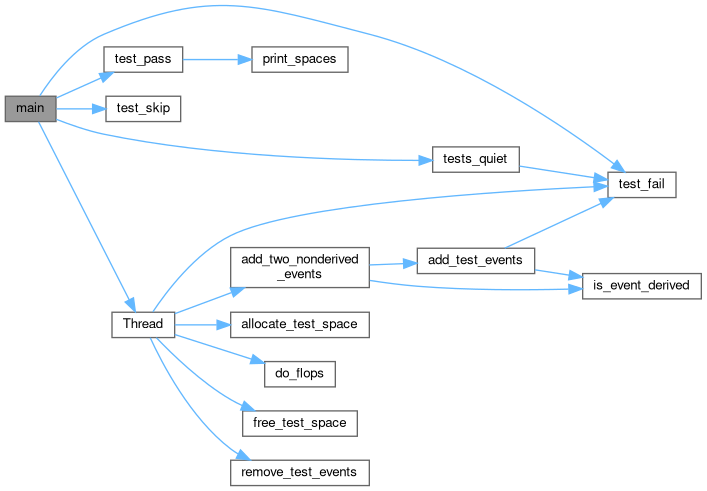Loading...
Searching...
No Matches
Include dependency graph for profile_pthreads.c:

Go to the source code of this file.
Macros | |
| #define | THR 1000000 |
| #define | FLOPS 100000000 |
Functions | |
| void * | Thread (void *arg) |
| int | main (int argc, char **argv) |
Variables | |
| unsigned int | length |
| vptr_t | my_start |
| vptr_t | my_end |
Macro Definition Documentation
◆ FLOPS
| #define FLOPS 100000000 |
Definition at line 14 of file profile_pthreads.c.
◆ THR
| #define THR 1000000 |
Definition at line 13 of file profile_pthreads.c.
Function Documentation
◆ main()
Definition at line 131 of file profile_pthreads.c.
132{
136 pthread_attr_t attr;
140
141 /* Set TESTS_QUIET variable */
143
147 }
148
151
154 }
155
160 else
162 }
163
165 retval = 1;
167 }
168
172
174
176
177 pthread_attr_init( &attr );
178#ifdef PTHREAD_CREATE_UNDETACHED
179 pthread_attr_setdetachstate( &attr, PTHREAD_CREATE_UNDETACHED );
180#endif
181#ifdef PTHREAD_SCOPE_SYSTEM
182 retval = pthread_attr_setscope( &attr, PTHREAD_SCOPE_SYSTEM );
185#endif
186
192 }
195
196 pthread_attr_destroy( &attr );
197
199
201
205 }
206
207 test_pass( __FILE__ );
208
209 pthread_exit( NULL );
210
211 return 0;
212
213}
Get the executable's address space info.
get real time counter value in clock cycles Returns the total real time passed since some arbitrary s...
get real time counter value in microseconds
initialize the PAPI library.
Query if PAPI event exists.
Initialize thread support in the PAPI library.
void PAPI_NORETURN test_fail(const char *file, int line, const char *call, int retval)
Definition: test_utils.c:491
void PAPI_NORETURN test_skip(const char *file, int line, const char *call, int retval)
Definition: test_utils.c:584
Definition: papi_fwrappers_.c:1518
Here is the call graph for this function:

◆ Thread()
| void * Thread | ( | void * | arg | ) |
Definition at line 20 of file profile_pthreads.c.
21{
29
33 }
34
38 }
39
41
42 /* add PAPI_TOT_CYC and one of the events in PAPI_FP_INS, PAPI_FP_OPS or
43 PAPI_TOT_INS, depends on the availability of the event on the
44 platform */
46
48
52 }
53
55
57
62 }
63
67 }
68
70
74 }
75
77
79
80 /* to remove the profile flag */
85 }
86
88
91 printf( "Thread %#x PAPI_TOT_INS : \t%lld\n",
93 } else {
94 printf( "Thread %#x PAPI_FP_INS : \t%lld\n",
96 }
97 printf( "Thread %#x PAPI_TOT_CYC: \t%lld\n", ( int ) pthread_self( ),
98 ( values[0] )[1] );
99 printf( "Thread %#x Real usec : \t%lld\n", ( int ) pthread_self( ),
100 elapsed_us );
101 printf( "Thread %#x Real cycles : \t%lld\n", ( int ) pthread_self( ),
102 elapsed_cyc );
103
104 printf( "Test case: PAPI_profil() for pthreads\n" );
105 printf( "----Profile buffer for Thread %#x---\n",
106 ( int ) pthread_self( ) );
111 }
112 }
115 break;
116
119 }
121
125 }
126
127 return NULL;
128}
Convert a numeric hardware event code to a name.
Generate a histogram of hardware counter overflows vs. PC addresses.
Notify PAPI that a thread has 'appeared'.
Start counting hardware events in an event set.
Stop counting hardware events in an event set.
Notify PAPI that a thread has 'disappeared'.
int add_two_nonderived_events(int *num_events, int *papi_event, int *mask)
Definition: test_utils.c:671
long long ** allocate_test_space(int num_tests, int num_events)
Definition: test_utils.c:46
Here is the call graph for this function:

Here is the caller graph for this function:

Variable Documentation
◆ length
| unsigned int length |
Definition at line 16 of file profile_pthreads.c.
◆ my_end
| vptr_t my_end |
Definition at line 17 of file profile_pthreads.c.
◆ my_start
| vptr_t my_start |
Definition at line 17 of file profile_pthreads.c.